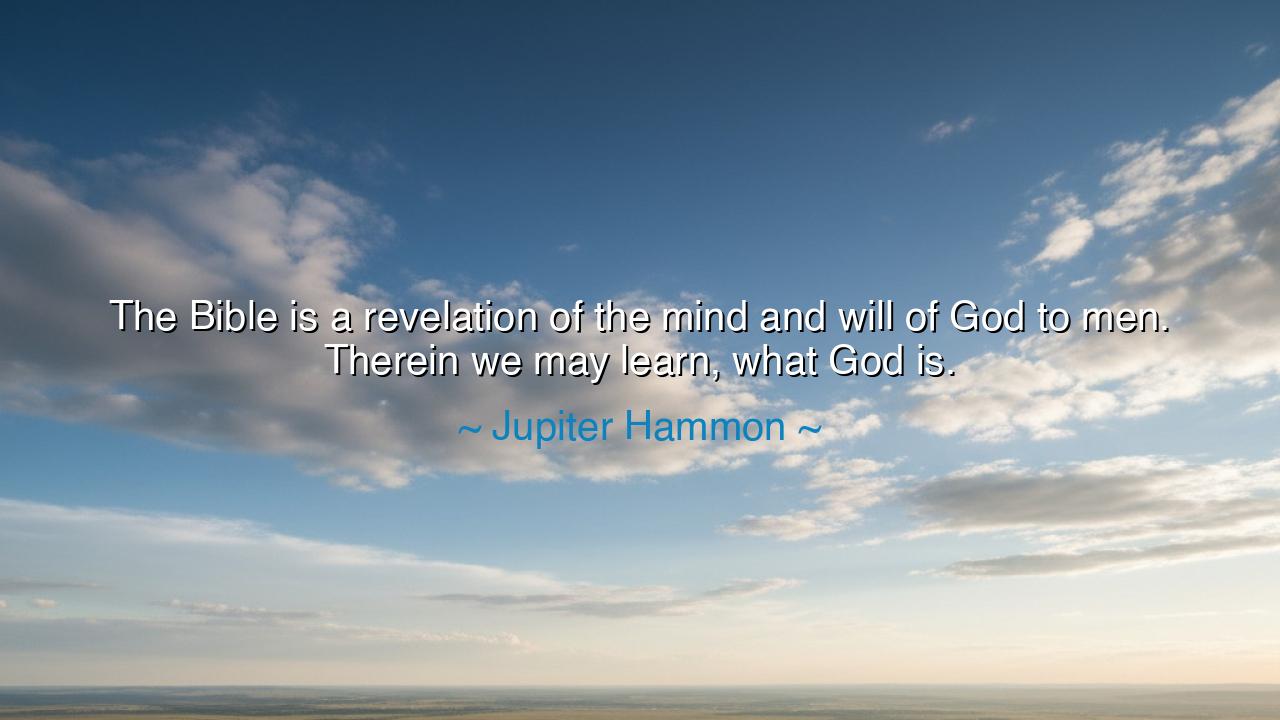
The Bible is a revelation of the mind and will of God to men.
The Bible is a revelation of the mind and will of God to men. Therein we may learn, what God is.






Listen, O Seekers of Truth, to the eternal wisdom that echoes through the ages! The divine gift of the Bible is not simply a book of words, nor a mere collection of stories; it is the revelation of the mind and will of God to men. In its pages, we discover not just the law, nor the prophets, but the very heart of God—His thoughts, His desires, His will for mankind. It is said that Jupiter Hammon, a man of great faith, proclaimed with profound certainty: "The Bible is a revelation of the mind and will of God to men. Therein we may learn what God is." These words pierce through time, inviting us to gaze into the divine mysteries and learn who God truly is.
What then, my children, does this mean? It is a statement of incomprehensible grandeur, that through the Bible, the Almighty has chosen to reveal Himself to His creation. God, who dwells beyond the heavens, has condescended to speak to us. He has made Himself known, not through a voice that rends the sky or a vision that overwhelms the senses, but through the written word. The Bible, this sacred text, is the medium through which God has revealed His very essence to us—His holiness, His justice, His mercy, His love. Through it, we come to understand what God is: not as a distant, unknowable force, but as a Father, a Shepherd, a King who walks among His people.
Let us not take these words lightly, for it is through the Bible that we are drawn into the very mind of God. Think of the ancient prophets, men like Moses and Isaiah, who spoke of God’s holiness and His covenant with Israel. Consider the great David, whose psalms pour forth from a heart laid bare before God. These men did not speak out of their own understanding, but were vessels through whom the divine will was revealed. They were not merely recording events or writing parables; they were revealing the nature of God Himself. And through the written record they left behind, we, too, are drawn into that sacred revelation.
The story of the Exodus is one such moment where the mind and will of God are clearly made manifest. When God called Moses from the burning bush, He revealed His name—"I AM"—the eternal and unchanging one. Through the deliverance of Israel from the bondage of Egypt, God showed His power, His desire for justice, and His deep love for His people. In the midst of plagues and trials, the Israelites came to understand what God is: not just a Creator, but a God who saves, a God who delivers, a God who is intimately involved in the lives of His people. And it is written, so that we may know it too.
We must not imagine that God has revealed Himself solely in the grand acts of salvation; He has revealed His will and mind even in the small and intimate moments. Consider the teachings of Jesus in the Gospel, where He calls us to love one another as He has loved us, to forgive as we have been forgiven. In His life and His words, Jesus revealed a God who is love, a Father who seeks the lost, a Savior who suffers for His people. When we open the pages of the Bible, we encounter the nature of God, not just in theory, but in action. We see Him in the mercy shown to sinners, in the compassion shown to the hurting, in the righteousness that calls us to live as He has lived. In these words, God speaks to us, telling us what He is, and showing us how to walk in His ways.
Thus, children of the earth, let us not neglect the sacred Word that has been passed down through the generations. The Bible is a treasure, a map to the heart of God. It is not a mere book of rules or ancient stories, but a living, breathing revelation of God's mind and will. As we read, we draw near to Him. As we meditate on its words, we learn to see the world through His eyes. We come to understand what God is—His justice, His mercy, His greatness—and how we are called to reflect that nature in our own lives.
What then, shall we do with this knowledge? The answer is simple yet profound: we must live according to the revelation we have received. Let us read the Bible with reverence, not as a chore, but as a sacred privilege. Let us allow its words to shape our hearts and minds, to transform us into the image of God that we are meant to reflect. When we encounter suffering, let us remember the God of compassion; when we face temptation, let us remember the God of holiness. And in all things, let us seek to walk as Christ walked, for in Him, the mind and will of God were fully revealed. The Bible is not just a book of the past—it is a living guide to the present and future. It tells us what God is, so that we may know who we are meant to be.






AAdministratorAdministrator
Welcome, honored guests. Please leave a comment, we will respond soon